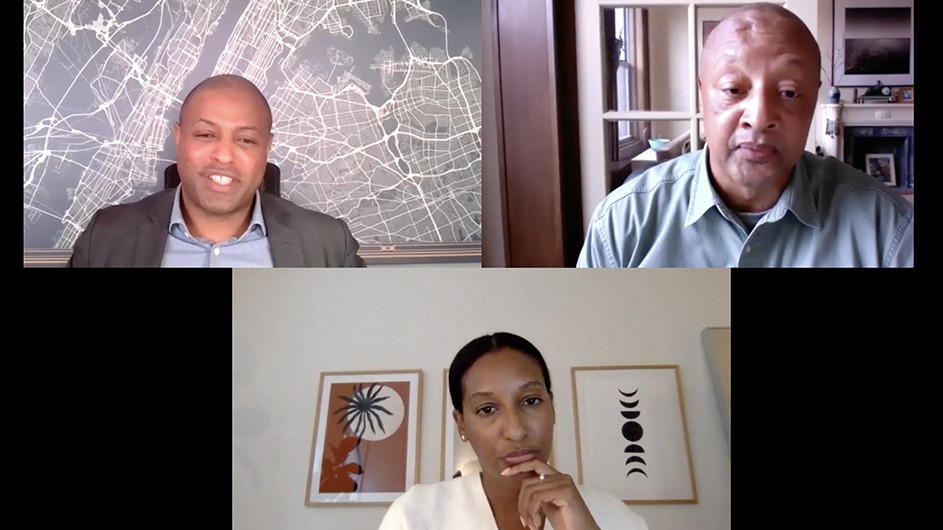How Can Columbia Effect Real Change With Community Partners?
In an online GSAPP event, Malo Hutson, Flores Forbes, and Akilah King discuss best practices and problems in partnerships.

On February 5, 2020, Professor Malo Hutson, director of the Ph.D. in urban planning program at Columbia’s Graduate School of Architecture, Planning, and Preservation, moderated a discussion that explored partnerships through three lenses: that of a community partner, a university administrator, and a university faculty member. These perspectives were offered, respectively, by Akilah King, CEO of the nonprofit organization Room to Grow, Flores Forbes, associate vice president for community affairs at Columbia, and Hutson.
Hutson posed three questions: How can GSAPP and Columbia in collaboration with community partners more effectively address pressing social challenges? What is the University doing now to deal with previous actions that have caused harm in the local community? What opportunities exist to build long-lasting relationships with community partners that lead to real change?
Recognizing Internal Expertise
Room to Grow, which supports low-income families with young children in New York and Boston, is currently involved in two partnerships with Columbia. Together with faculty from the School of Social Work and Teachers College, the group is participating in a randomized control trial that aims to evaluate the impact of its program model. Room to Grow is also working with Columbia World Projects and President Bollinger’s Office to expand and continue the trial, and potentially enhance its program model.
Although nonprofits are frequently referred to as “projects” by funding partners, it’s necessary to remember that these organizations are “not just a sandbox for experimentation,” said King. Room to Grow is an evolving business on which the livelihoods of its employees and participants depend.
“We are fortunate to be invited to work with Columbia, but remember that we have something to offer, too,” King said. “Together, we can create a deliverable that is not only comprehensive, but implementable.”
King spoke about how a nonprofit can feel beholden to funders, sometimes resulting in tension or an identity crisis. She recommended that partners discuss power dynamics should those issues emerge. Lastly, she mentioned the critical need for Room to Grow to build trust with program participants.
“When you bring in research partners who are interacting with our families, especially for the 94% of our families who are of color, it’s important for us to stop and talk about the history and dynamic of people of color participating in research,” King said.
Building the Necessary Infrastructure
Forbes is a member of a new task force convened by President Bollinger in response to his call to action on anti-racism. Although this task force has several objectives, Forbes focused on Columbia’s partnerships with communities in Harlem.
Forbes, who is also an urban planner, realized through the task force that the Columbia-Harlem Small Business Development Center sponsored by the Columbia Business School is the University’s strongest partnership-based resource. As a result, Columbia decided to increase support for the program and establish an emergency loan fund for small businesses. The task force also assessed the 2009 West Harlem Community Benefits Agreement, among other community-based programs.
“We met with internal stakeholders about how to work together. We quickly realized that this was new to us because we were not organized, but siloed. We needed an infrastructure to develop this project,” Forbes said.
Although the task force initially looked at community development corporations, Forbes found the model insufficient. Instead, the Community Development Finance Institution, a private-sector entity that can receive federal funding through the U.S. Department of the Treasury, provided a more promising model for Columbia’s necessary infrastructure. A feasibility study is underway.
“It’s probably one of the most important organizational efforts in terms of Columbia harnessing its intellectual capital to help improve a community that has been devastated by a pandemic,” Forbes said.
Breaking Down Silos
Hutson, who is also the director of GSAPP’s Urban Community and Health Equity Lab, then spoke about his experiences via the lab partnering with institutions. Interdisciplinary research is at the core of his work, which involves community development, health equity, and the circular economy.
“How do we take our research and scholarship and try to influence or transform institutions, whether it’s a nonprofit or a place such as Columbia?” said Hutson. “Can this work lead to policies and practices that prevent the health inequities we see both domestically and internationally?”
Recently, the Urban Community and Health Equity Lab received a grant from the Columbia Population Research Center. This funding enables Hutson and his colleagues to collaborate with school districts in California and Virginia to study how farm-to-school programs are supporting healthy eating habits in the context of COVID-induced school closures.
Hutson also emphasized that “to be effective, you have to build partnerships within communities, the government, and the private sector.”
He gave the example of a proposal he made for an eco-community retrofit project in New York City: “If you took a whole block, and you completely made that an eco-friendly block—from retrofitting all of the buildings to thinking about the energy usage, waste usage, water transportation, and so forth—what could you do? Over time, what kind of changes could you see within that community?”
Hutson envisions a future collaboration with the New York City Housing Authority or another nonprofit housing developer interested in approaching retrofits through a more sustainable, holistic approach. “How can we create a partnership where the residents are part of the overall solution and the public health intervention to bring about real change?”
Shannon Werle is the digital editor in the communications office at GSAPP.